“A sweet tale of sibling love, told without sentimentality”
Summer Brother
By Jaap Robben, translated from the Dutch by David Doherty (2021); World Editions
Review by Pam Foley, adult sibling.
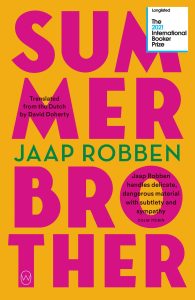
Teenager Brian comes from a dysfunctional family; his parents are divorced and he lives with his conniving father in a trailer home, located in a remote Dutch landscape. He is the only child on the site. When Brian’s physically and mentally disabled brother, Lucien, who lives in a care home, needs to be relocated due to building renovations, their dad sees a financial opportunity and arranges for Lucien to spend the summer with them in their trailer. But their dad is often not around, leaving Brian to take care of Lucien.
This is an account of a young teenager who is unwittingly put into a position of having to take care of his older disabled brother, learning about Lucien and his many and varied needs as the days progress. Brian is accepting of Lucien’s world which includes others in Lucien’s care home, interacting with Lucien and others in an innocent and non-judgemental way. He is gentle and loving toward them, even when forced to undertake unpleasant tasks. Brian is clever, caring and connected to others’ needs. This is a lovely and sweet tale of sibling love, told without sentimentality. The reader is left with the sense that Brian is not a hero, as contemporary cliché dictates – he is simply acclimatising to his new normal.
“There are so many sentences in this book that perfectly describe my own feelings as a sibling of a disabled person”
Siblings: Brothers and sisters of children with disability
By Kate Strohm (2014); Wakefield Press
Review by Sarah-Jane, adult sibling
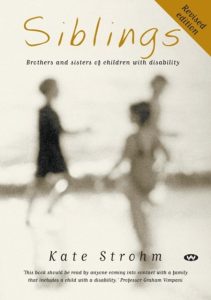
I realise that a short summary / review of a book cannot include countless quotes and little else but that is exactly what I found myself wanting to write because there are so many sentences in this book that perfectly describe my own feelings as a sibling of a disabled person:
- “I wanted to make life easy for my parents to make up for their pain”
- “It was clear that at some point the development of my identity had been hindered”
- “I had a very strong sense that (bad/difficult/tragic) things just happen”.
Siblings is a really comprehensive exploration of being a sibling based on Kate’s own life and also includes descriptions of different emotions and situations from other siblings. There are brief summaries and possible solutions at the end of each chapter so it’s easy to refer back to particularly relevant bits. The third part of the book is strategies which may help with some of the challenges of being a sibling.
I recommend reading this book if you want to explore some of your own experiences growing up as a sibling and how it affects you as an adult. It may touch on some uncomfortable or sad feelings but for me it has helped to make sense of so much.
“Readers with siblings who live with disabilities will resonate with Meg”
The Sound of Turquoise
By Gill Gregory (2009); KUPress
Review by Jenny, adult sibling
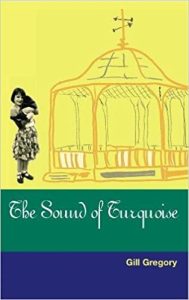
Gregory creates a space through The Sound of Turquoise to explore her childhood memories, of the relationship with her disabled brother Andrew and her Grandfather Alexis. She uses Meg, the protagonist, to enable her to revisit her experiences which perhaps were too painful to address directly. In doing so, it gives the story a slightly fictional less biographical feel.
This is a subtle, beautifully written multi-pronged story of family relationships, migration and your place in history. Readers with siblings who live with disabilities will resonate with Meg. Her deep love for her brother, her desire to protect him but also her feelings of embarrassment, confusion and guilt are all too real. However, Gregory cleverly intertwines memories of Andrew with a recounting of her Grandfather’s escape from war-torn Uzbekistan in 1904. This changes the stories direction at well-appointed intervals, stopping the story from becoming too self-reflective or melancholy.
Gregory vividly describes the attitudes and perceptions of the time (mainly 1900-1960), giving a strong sense of the people who frequented each period, from the terrible events leading to migration at the turn of the century through to the newfound freedoms of the modern era. Ultimately it explores how trauma continues to run through and influence family generations from the vantage point of the future. Very touching and compelling.
“It made an impression on me”
A Little Life
By Hanya Yanagihara (2020); Picador
Review by Sara, adult sibling

In her 2015 novel A Little Life, American author Hanya Yanagihara tells, rather beautifully, of a sibling relationship between Willem and the late Hemming. Their Icelandic father and Danish mother emigrated to the US from Sweden and raised the boys in Wyoming, Hemming, who died as a young adult, was severely disabled and pre-verbal. Writing from Willem’s point of view, Yanagihara describes Hemming with tenderness, and conveys Willem’s deep love for his brother. The episode only takes up a couple of pages in a 750-page novel but it made an impression on me. Yanagihara notably focusses exclusively on Willem’s feelings, treating them as a separate entity unconnected to the parental relationship with the disabled child. A Little Life was a huge bestseller on both sides of the Atlantic, and was turned into a West End play.
“An easy-going, heart-warming read that finally makes you feel heard”
Goodbye Tsugumi
By Banana Yoshimoto, translated from the Japanese by Michael Emmerich (2002); Faber & Faber
Review by Freya, adult sibling

Maria, the narrator, explores her cousin Tsugumi’s relationship with the rest of her family and the wider community. Tsugumi has a lifelong debilitating physical illness and the two cousins have been bought up as siblings, making this book feel so relatable. The frustrations of challenging behaviour, the constant worry of relapses and the different perspective a disabled sibling gives you are all explored in this novel. I felt that Yoko, Tsugumi’s older sister, mirrored many characteristics that I see in myself too and it was empowering to see her character’s strength celebrated. Yoshimoto’s softly nostalgic tone made it feel like a friend chatting to me in cafe about experiences which feel entirely relatable. I recommend this book if you want an easy-going, heart-warming read that finally makes you feel heard.
“I gained a lot of comfort from the theme of acceptance”
Sleepovers
By Jacqueline Wilson, Illustrated by Nick Sharratt (2001); Young Corgi
Review by Liz, adult sibling
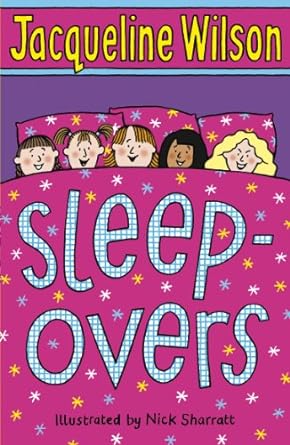
Daisy has recently started at a new school and is keen to fit in with her new set of friends – nicknamed the ‘Alphabet Girls’ thanks to their matching initials. The gang includes potential future best friend Emily, as well as the spoiled and bullying Chloe, who never misses a chance to make Daisy feel small.
When the group take turns to celebrate their birthdays with sleepover parties, Daisy begins to feel anxious. She hasn’t told anyone about her sister Lily, who is non-verbal, with physical and developmental disabilities. As her own birthday grows nearer, she finds herself questioning if she should invite them over and whether they will accept her big sister.
This short book, aimed at younger readers, skilfully blends in big themes in an accessible, sophisticated way. Readers can experience Daisy’s conflicted emotions towards her sister, the impact of caring on family life and the skills and challenges gained from being a sibling. Wilson has a great insight into the importance of fitting in and belonging in the formative primary school years.
I read this book as an adult, at a time when I was struggling to find any literature that reflected my own experiences. Although my circumstances are quite different to Daisy’s, I gained a lot of comfort from the theme of acceptance, as at the time I felt isolated and ashamed of my embarrassment towards my autistic sibling’s non-conforming behaviour.
Without any spoilers, the story ends on a moving and positive note, and you may shed a tear. It would benefit both Sibs and their “non-Sib” friends to read this compassionate gem of a story.
“The Music Room is a book entirely focused on siblings, a rare gem of understanding from an author who has been there too”
The Music Room
By William Fiennes (2009); Picador. Costa Book Awards shortlist 2009.
Review by Freya, adult sibling
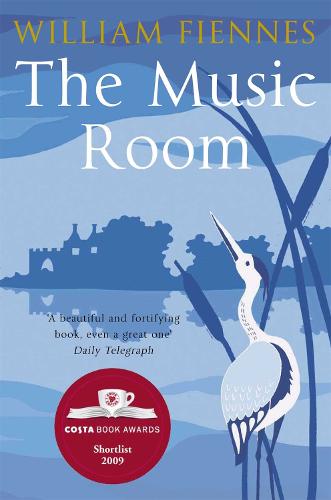
This beautifully written book has three interwoven strands: the moated castle home, his relationship with his epileptic older brother Richard and the history of epilepsy. They twist together elegantly, and I found symbolic significance in the way that they were always discussed separately, and yet form one novel: as siblings, we too have very separate components to our lives. I was particularly moved by the inclusion of Richard’s emotional variations stemming from his disabilities. Fiennes shares the constant change from warm and loving to violent and harsh, a tricky area to navigate for siblings. He doesn’t hold back in revealing that sometimes he liked these moments of tension, of being able to wind his sibling up like a more conventional relationship or how it gave him more attention from concerned parents. Not only was this so relatable, but it was also the first time I have seen this in any book. The Music Room continues into adulthood, and Fiennes talks about conflicted priorities as he grew older between his brother and the wider world. Again, it just felt so relatable and is a moving novel of love, family and loss. At its core, The Music Room is a book entirely focused on siblings, a rare gem of understanding from an author who has been there too. I found it an easy read to pick up and put down – perfect for winding down before bed. There are no chapters, just four parts divided by the strands, which makes for effortless reading.